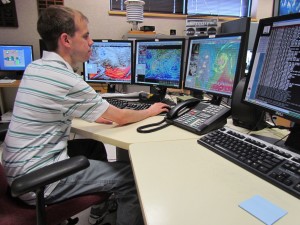 A meteorologist is responsible for forecasting the weather. However, this is not the only task for which a meteorologist is responsible. Meteorologists are also expected to conduct scientific research. They also often function in professor roles as educators. Another important function of a meteorologist is working to predict and alleviate the damages of natural disasters such as tornadoes, earthquakes, and hurricanes.
A meteorologist is responsible for forecasting the weather. However, this is not the only task for which a meteorologist is responsible. Meteorologists are also expected to conduct scientific research. They also often function in professor roles as educators. Another important function of a meteorologist is working to predict and alleviate the damages of natural disasters such as tornadoes, earthquakes, and hurricanes.
A meteorologist’s role could vary greatly depending on the area in which he or she specializes, according to the World Meteorological Organization. While a meteorologist might work in atmospheric research studying phenomena such as climate change and atmospheric events, he or she might also be more enmeshed in matters like transportation safety or engineering. Meteorologists also sometimes work in the air transportation industry so that they can look out for microbursts that might compromise the safety of a flight, for example.
Other job roles of meteorologists include working for architects. Sometimes, meteorologists are needed to help architects design a variety of different structures. If an architect is in the process of constructing a commercial structure, he or she might need to know the demands that will be placed on that structure’s HVAC system. The task of designing a HVAC system that works well in a particular structure can be a challenging one, so architects will look to meteorologists for assistance.
Education
Probably one of the most important roles of a meteorologist is as an educator. Meteorologists can pass on their knowledge by working in academic institutions. They can teach students at any level- from undergraduates to doctoral candidates. In a university, meteorological sciences are generally classified under the natural sciences in earth science courses.
Technology in Meteorology
New advancement in technology have revolutionized the field of meteorology in recent years. The equipment used to conduct studies in meteorology nowadays will include aircraft, radar tools, satellites, software, and computers. These kinds of equipment can be used to collect and analyze data regarding the atmosphere and the surface of the Earth. Advancements in technology have improved the accuracy and advanced the capabilities of meteorology. They have also generated growth in the field of meteorology.
Different Types of Meteorologist
Meteorology can be considered a very broad field. There are many different specializations within meteorology that aspiring meteorologists can focus on to tailor their career to their unique interests. Some of the following are meteorology specializations:
- Research – A research meteorologist will work with an organization such as the National Weather Service to explore problems or debates on issues related to climate.
- Broadcast – A broadcast meteorologist is the most widely recognized type of meteorologist. These individuals are responsible for giving the weather report on TV or over the radio.
- Forensic – Forensic meteorologists are frequently hired by insurance companies to investigate accident claims related to weather incidents.
- Consulting – Companies come times hire meteorologists to help analyze how weather patterns might affect their sales.
- Climate – Climate meteorologists study the climate and analyze patterns in climate trends.
Related Resource: National Weather Service
An individual interested in becoming a meteorologist can look forward to a fascinating career that combines study of both the natural and physical sciences.